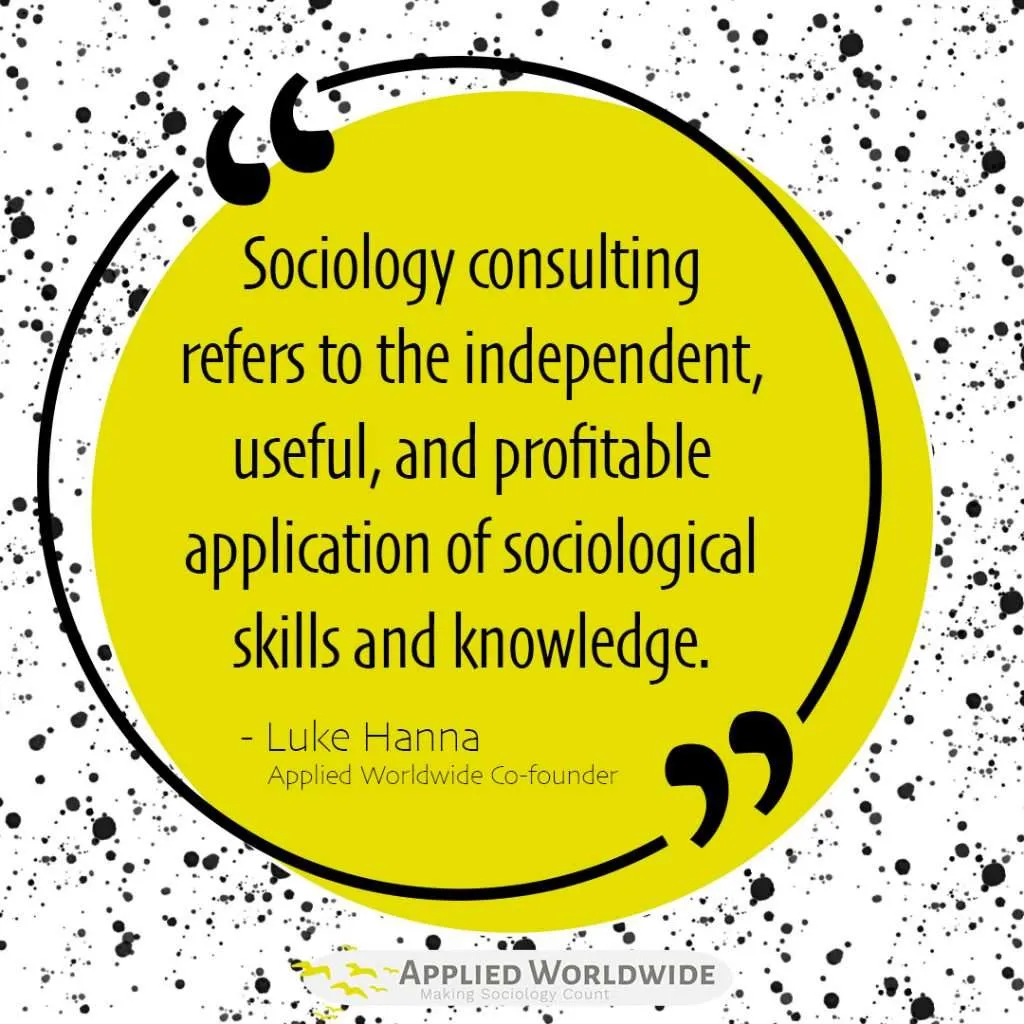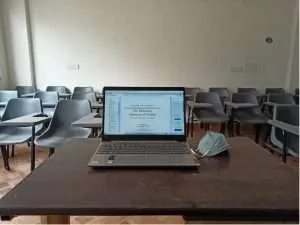Applied Sociology is the use of sociological skills and knowledge to improve the well-being of society, but there is much more context to the question, “What is Applied Sociology?” Applied sociology has a long and interesting history, including the many challenges applied sociologists have faced. But, many professional opportunities remain despite those challenges. In this article we address applied sociology’s history and current state, including examples of applied sociology and valuable sociological skills.
What is Applied Sociology from a Historical Perspective?
From a historical perspective, Lester Frank Ward represents the first understanding of applied sociology in the United States. Prior to Ward’s publication of Applied Sociology: A treatise on the Conscious Improvement of Society by Society, much of the discipline believed that sociologists should only describe social processes rather than change them.
Ward was one of the first in the United States to suggest sociologists ought to use our knowledge to make society better for people. In doing so, Lester Ward made the differentiation between applied sociology, pure sociology, and dynamic sociology.
Lester Ward on Applied Sociology
To Ward, pure sociology was the production of knowledge. We may think of this type of sociology as what many people refer to as ‘academic sociology.’ Within pure sociology, researchers use their theoretical and methodological skills to improve the overall knowledge-base in the discipline. Pure sociology has mostly manifested itself through journal articles and academic book publications. Contemporary pure sociologists work as tenure track professors, often at research-centered universities.
In addition to pure sociology, Lester Ward described an applied sociology. According to Ward, applied sociology occurs when professionals organize sociological knowledge into interventions that improve the well-being of society. In contemporary sociology, the practice of applied sociology is diverse. Therefore, we touch on contemporary examples in more depth in a later section of this article.
Finally, Lester Ward wrote about a dynamic sociology. Dynamic sociology, according to Ward, occurs when the production of knowledge is worked seamlessly into application. In these instances, sociological knowledge is be produced, organized, and applied to make society better.
What is Applied Sociology in Contemporary Society?
Lester Ward clearly envisioned a unity between applied and pure sociology, yet we continue to see a tension where applied sociology is seen as a threat to its counterpart. We would like to share a quote that demonstrates this tension. In 2019, we conducted several interviews with applied sociologists who were working in consulting careers. One of my participants had this to say.
“Applied sociology is seemingly viewed as a threat to research or in opposition to academic work. This is untrue. There are careers in applied sociology and we need to be filling these positions and, in fact, we need to be creating these positions. In order for that movement to occur, we must first move away from thinking of applied sociology as a threat. We need to have conversations. We must discuss the meaning of applied sociology and must participate. Additionally, we must educate our students and graduate students about applied sociology and how to become a part of the movement.”
In this quote, we see an applied sociologists talking about the problem with applied sociology. Application is important and valuable, but we need to be able to have conversations while we are training to prepare folks for their applied sociology careers. In essence, this problem became the foundation for Applied Worldwide. We believe we can reduce the narrative that applied sociology is a threat by enhancing the vision of applied sociology as a valuable and marketable set of skills.
Bringing Applied Sociology to the Internet
We believe the internet is a great starting place because when academic departments are unable to offer proper advice, students interested in applied sociology will have to conduct their own searches. To demonstrate a situation where a graduate student was unable to find proper advice, let’s look at this quote from a student at a PhD granting sociology department.
“I remember being in my professional seminar during my first semester of graduate school. There was probably around a dozen of us in the class and about half of us were really excited for the seminar because we were hungry to use our future degrees. As the seminar progressed we began to understand that we were only learning how to become tenured professors. Folks started asking questions like, ‘What are non-traditional sociology careers?,’ and ‘Can we talk about applied sociology?’
Our professor became immediately nervous by these questions. He asked one student to stand up and close the doors to the classroom. He continued to tell our class that we should not be asking these questions publicly because there were some powerful professors that would be upset if they heard we were not interested in tenure track jobs.”
The story above demonstrates an important point in regard to applied sociology. It is obvious that discussing applied sociology is discouraged in particular circles. This point seems to be especially true in departments with faculty concerned with their own individual legacy. We suppose these faculty would rather invest their time and energy in students who will take tenure track positions at prestigious universities and continue their line of pure sociological research.
Because of this lack of willingness to engage students in applied sociology, certain terms may be necessary to introduce before moving forward.
Applied Sociology Terms
There are a lot of different terms associated with applied sociological work. Here, we provide a few important terms that are regularly used by today’s applied sociologists.
Client
Clients are important in applied sociology. If you spend any amount of time around applied sociologists, you will hear them talk about their clients. An applied or clinical sociologist’s livelihood revolves around their ability to meet and maintain relationships with clients. A client is a community member or organization paying a sociologist for services.
Sociology Consulting
We have previously defined and discussed sociology consulting. In short sociology consulting is “the independent, useful, and profitable application of sociological skills and knowledge.” As a consultant, an applied sociologist will work closely with clients to use skills and knowledge to improve society. These efforts may address organizational culture, structure, or policy.
Clinical Sociology
The Association for Applied and Clinical Sociology defines clinical sociology as,
“The use of sociological theories, concepts, and methods to carry out the same examinations with the primary purpose not only to translate findings, but also design, implement, and evaluate interventions meant to improve outcomes and respond to challenges.”
We see that clinical sociology goes beyond sociological translation into the realm of implementing solutions to problems. Often, clinical sociologists work with clients to help solve organizational problems.
Community-Engaged
We often hear the term ‘community-engaged,’ in sociology. It might be in discussion of a community-engaged class or someone who is conducting community-engaged research. This buzzword simply means integrating the local community into the sociological process. Community-engaged researchers will conduct research with members of the community rather than on members of the community. Further, community-engaged courses offer students the opportunity to apply their sociological knowledge in the local community rather than simply thinking theoretically.
Examples of Applied Sociology
The suppression of applied sociology exists around the world! Our quotes from sociologists above demonstrate the problem in the United States. Sociologist Maham Shah discusses a similar problem in Pakistan in her article, Practicing Sociology in Pakistan: Applying the Discipline. We have also heard similar sentiments from writers in Nigeria, Venezuela, and Canada.
Professional Organizations
Fortunately, there are resources to help people use their skills as applied sociologists. Some of the best resources are professional sociological associations. Nearly all of these organizations have or are creating sections specifically related to applied sociology. Joining these groups can help students find mentorship and other professional development resources.
- Association for Applied and Clinical Sociology
- Sociologists for Women in Society
- American Sociological Association section for Sociological Practice and Public Sociology
- British Sociological Association Applied Sociology Group
- Canadian Sociological Association Applied and Community Engaged Sociology Cluster
Profiles of Applied and Clinical Sociology
All of the above mentioned organizations are Applied Worldwide partners for our Profiles in Applied and Clinical Sociology Project. You can browse those profiles to see the kinds of work applied sociologists are conducting. In these profiles, you will find suggested readings, suggested courses, and other tips for translating your sociological experiences into careers in applied sociology.
Through our profile project we have established some of the primary industries where sociologists can have applied sociology careers in our contemporary society. Current industries where applied sociologists are making a mark include Health and Medicine, Business, Technology, and Criminal Justice.
Health and Medicine
To someone just learning about sociology, applying social science to health and medicine may not seem to make a lot of sense. However, medical sociology is a popular subfield within the discipline and those who practice it are equipped with knowledge on healthcare systems, health policy, medical education, and more—all from a sociological perspective. Our own Dr. Stephanie Wilson, for example, works with medical doctors conducting research on point-of-care medical information systems meant to assist providers in their clinical decision-making.
We’ve also profiled various professional sociologists who apply their skills in health and medicine. Lorella Palazzo, Karen Albright, Professor Robert Dingwall, Raeda Anderson, Catherine van de Ruit, Austin H Johnson, and Chloe E. Bird all offer their sociological skills in health-related settings. Our annual student essay competition also brought insight on sociology as it applies to health in medicine in two separate essays on nursing, including one essay titled “Sociology is Important in Nursing and Beyond.”
Business
Whether sociologists are starting their own businesses or using their skills to improve the business industry, this is one domain where sociologists are finding success. We see many applied sociologists being entrepreneurial with their skills and starting their own businesses. Josh Packard, Gary David, Karen Albright and others have all started their own businesses using various sociological skills.
Others use their sociology to improve businesses. Anthony Buono, Robert Dingwall, Gina Finelli, and Andrew Cohen all represent examples of sociologists working in business.
Technology
Technology is big business and there is plenty of room for sociologists to get into the industry. Applied Worldwide has conducted its own second domain analysis of the tech industry where we analyze job postings from major technology companies. We also have a call from a sociologist working in the tech industry titled, “Sociologists, the Tech Industry Needs You!” Both of these articles outline sociology jobs and skills in the technology industry.
Another recently published article called “The Rise of Women in Tech: Going Against the Gender Script” applies sociological ideas on gender socialization to the technology industry.
In addition to jobs in technology companies, sociologists are also well-equipped to offer branding and media services. For example Andrew Cohen and Temidayo Jacob, both describe how sociology helps them in their careers.
Criminal Justice
One final industry in which sociological skills are well-represented is criminal justice. Many sociologists incorporate criminology and legal studies into their work and training. That means they come away from school with deep understanding of our justice system and the organizations within it.
The first example we have to share is Lauren Gant. Lauren works with a team of researchers in Colorado with a goal of improving state-level criminal justice organizations and systems. Another example is Jackie Henke, who worked as a data analyst for the Superior Court of California. Lastly, we have James Frazier who uses his sociological skills in sex offender treatment programs.
Applied Sociology Skills
Communication
Communication is one of the most valuable sociological skills. Throughout their education, sociologists learn to effectively communicate publicly, interpersonally, and in writing.
One of the most feared professional skills is public speaking, yet most sociology students gain experience with public speaking in their classes or when they attend professional conferences. We need to harness these experiences and demonstrate to employers that we are effective public communicators.
Second, it is important for sociologists to be good interpersonal communicators. As an example, think about interviewing, a research method many sociologists practice. To effectively extract information and stories from interview participants, sociologists must be proficient interpersonal communicators.
Finally, sociologists write a lot in their education. Once again, we ought to be advertising ourselves to employers as people who can effectively communicate through writing. We have previously written about how we believe writing is the most prized skill in sociology in an article titled, “Writing in Sociology: One of our Most Valuable Skills.”
Research Methods
Research methods are the most discussed skill amongst the applied sociologists we interviewed in our profiles project. Nearly all of the professionals who responded mentioned research methods as a valuable skill.
Importantly, the type of research methods was less important. Both qualitative methods such as interviews and ethnography, as well as quantitative methods like statistics and data visualization are useful to practicing sociologists. In fact, when discussing research methods, most professionals suggested students learn as many methods as possible to add to their toolkits.
Empathy
The last applied sociology skill we want to emphasize in this article is empathy. Sociologists are constantly challenged to take the perspective of others. We are always mastering new theories that teach us about the diverse lived realities of groups within society. When we analyze interview data, for example, we must understand the experiences being outlined from the perspective of that participant, or group of participants.
A latent function—to use sociology terminology—of those educational experiences is empathy. By learning to understand social problems at the social structural level, rather than simply at the individual level, we learn to empathize with individuals whose agency is constrained by those structures. You can read more about the relationship between applied sociology and empathy in this student essay.
Conclusions on What is Applied Sociology?
So, what is applied sociology? Applied sociology is the use of sociological skills and knowledge to improve the well-being of society. Applied sociologists use their skills with clients, as consultants and in clinical or community settings. Some of the professional domains where applied sociologists have found career success include health and medicine, business, technology, and criminal justice. Communication, research methods and empathy are some of the most cited valuable professional skills that sociologists acquire through their education.
Applied sociology is a discipline open to folks with a variety of educational backgrounds. A PhD is not required to practice sociology, and we hope the diverse professional experiences we shared here make that apparent!








